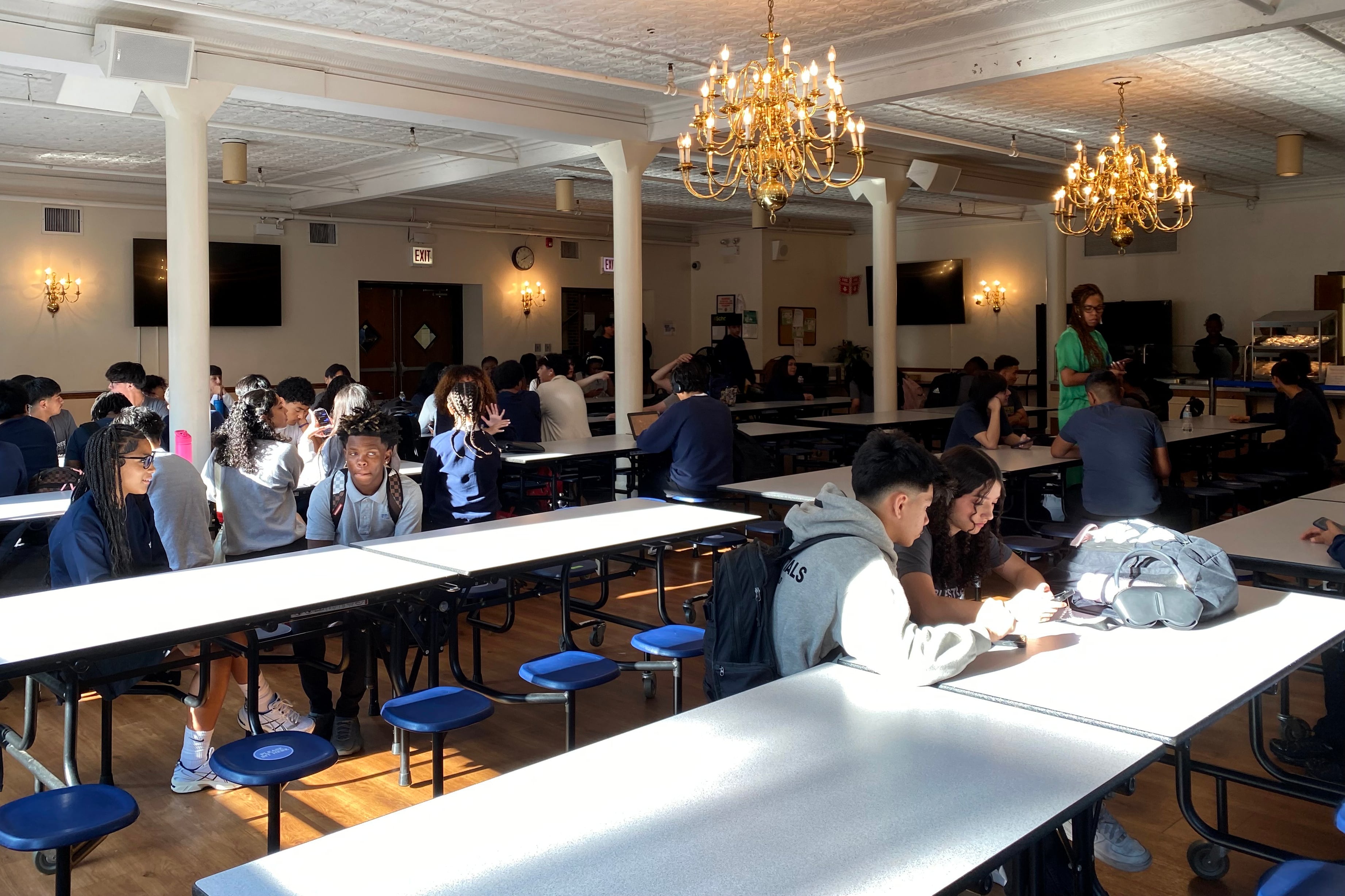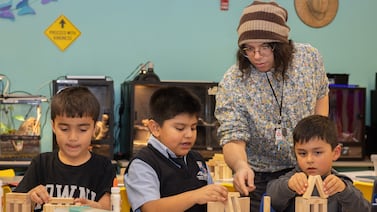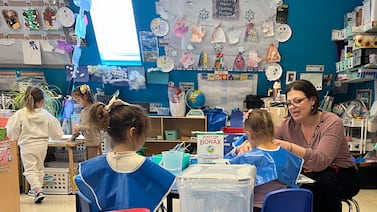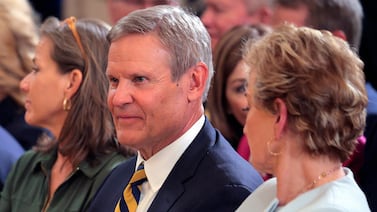Sign up for Chalkbeat Chicago’s free daily newsletter to keep up with the latest education news.
As Brenda Cora weaved around noisy teenagers who filled the cafeteria of Noble Street College Prep on the first day of classes for the charter school network, she thought back to her time as a student. Twenty-five years ago, she had three different classes in the space: science, math, and advisory.
“This was my advisory classroom,” she said, pointing to a storage room now stocked with food and three large refrigerators off the main room of Burnside Hall.
That was in 1999 and Cora, now Noble’s chief of schools, was one of around 100 freshmen attending what was then an entirely new school still under construction when the school year began.
The previous year — in April 1998 — Chicago’s Board of Education gave two Chicago Public Schools high school teachers and the Northwestern Settlement House permission to open Noble Street College Prep in the city’s West Town neighborhood as one of the district’s first charter schools.
At the time, these privately-managed, publicly-funded schools were a new concept, created by Illinois law in 1997. The idea — which emerged out of the progressive movement and was popularized by Albert Shanker, the former president of the American Federation of Teachers — was to create schools free from bureaucracy and certain regulations to experiment and innovate.
Cora heard about Noble when she was attending Ames Middle School in Avondale, now a military high school. Knowing she wanted to go to college, she applied and went to Noble’s auditorium where she waited to find out if she got a spot through the lottery admissions.
“I do remember there was one of those bingo rollers, where they were pulling out names,” Cora said. “I was just paying attention to whether or not I was going to be able to get into the school that I really wanted to attend.”
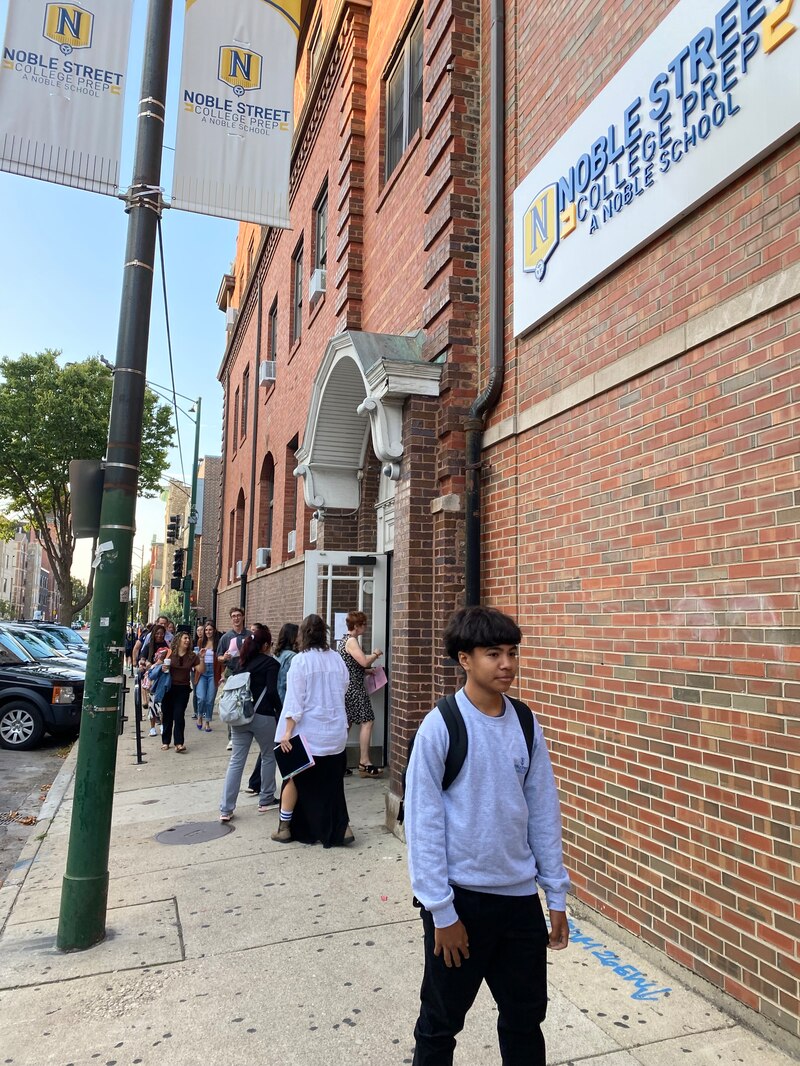
Throughout the 2000s, CPS greatly expanded charter schools, including Noble, which now operates 17 high school campuses and one middle school serving more than 12,300 students. The network has evolved over the past 25 years. After the resignation of co-founder Michael Milkie in 2018, the network moved away from a “no excuses” approach to discipline, loosened its dress code policy, and adopted a more transparent pay scale with higher pay for experienced teachers.
There’s no more bingo roller for lottery admissions either. Now, all CPS eighth graders use a centralized application to get into high school.
Mayor Brandon Johnson and the Chicago Teachers Union have criticized the district’s system of school choice, in which families can leave their assigned neighborhood school to attend a wide array of selective, magnet, and charter schools, for creating “a Hunger Games scenario” for students. Chicago’s Board of Education is reevaluating how school choice works and is expected to share more details in a forthcoming strategic plan.
That looming debate over policy was a world away on Friday, as the cafeteria of Noble’s original campus, dubbed “The OC” by staff and students, buzzed with first-day energy. A group of seniors sitting at a table under an ornate chandelier reflected on why they chose Noble.
“I chose Noble because it prepares you for college,” said senior Lianisse Rodriguez, who hopes to attend Arizona State University next fall. “My sisters went here. They told me it was a good school, and when they went to college it prepared them.”
Senior Mileani Solis, the youngest of 10 children, said she also chose Noble because her siblings attended the school and one now works there.
“I chose Noble because my sister came here,” said senior Ethan Del Valle. “I know that they will get me college ready for when I need it, because I have big aspirations. My dream school is M.I.T.”
These students remind Cora of her younger self. She graduated from Noble in 2003. As a member of the first graduating class, Cora worried that she might not get accepted to college because admissions officers might not know about her newly-created high school.
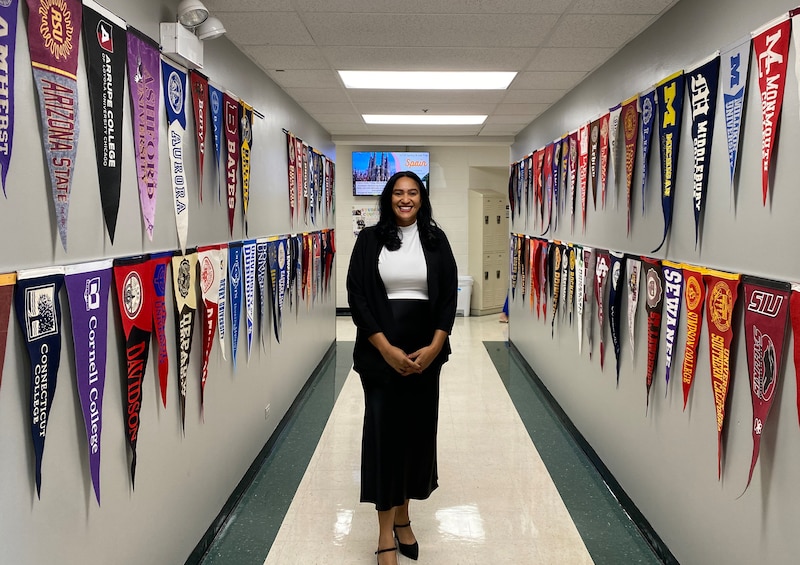
“What if they don’t accept me because they don’t know about Noble? What if this portfolio doesn’t really mean anything to the colleges across the nation?” she remembered thinking.
But that was not the case. Cora went to Grinnell College in Iowa and returned to work at a new Noble campus, Rowe-Clark Math & Science Academy, as dean of students in 2007. Now, as chief of schools, she oversees six campuses, including Rowe-Clark, where she served as principal for six years.
There are about 28,700 Noble alumni, 5,000 of whom have earned their bachelor’s degrees, according to Noble spokesperson David Brown. Thousands more are actively pursuing degrees.
Ellen Metz, Noble’s head of schools, said getting students to and through college is still the charter network’s main focus, despite strong headwinds making it a tougher sell for many families, including rising costs, the end of affirmative action, and troubles with the FAFSA.
“We believe that our students deserve college for all the things that college provides whether it’s social mobility, whether it’s longer life expectancy, whether it’s the likelihood that a college graduate will participate in democracy, to just those years in college that hopefully provide an opportunity to explore one’s own identity,” Metz said.
Metz served as the principal of the original Noble Street College Prep from 2014 to 2019. As she walked the halls Friday, she greeted and hugged dozens of teachers, many who were entering their 10th, 18th, even 20th year teaching at the school.
Metz acknowledged there have been “really dire errors that were rooted in structural racism” that led to many neighborhood schools not being funded properly. But she added it’s not possible “to go back and fix history.”
As part of the renewal process for charter schools, the Chicago Board of Education recently renewed Noble to operate another five years.
“We’ve got to move forward,” Metz said Friday, adding that she hopes Noble will continue to work in partnership with CPS for at least another 25 years to come.
Becky Vevea is the bureau chief for Chalkbeat Chicago. Contact Becky at bvevea@chalkbeat.org.

